Nothing, and everything Spectre of losing common bond inside encampment adds to despair
Read this article for free:
or
Already have an account? Log in here »
To continue reading, please subscribe:
Monthly Digital Subscription
$0 for the first 4 weeks*
- Enjoy unlimited reading on winnipegfreepress.com
- Read the E-Edition, our digital replica newspaper
- Access News Break, our award-winning app
- Play interactive puzzles
*No charge for 4 weeks then price increases to the regular rate of $19.00 plus GST every four weeks. Offer available to new and qualified returning subscribers only. Cancel any time.
Monthly Digital Subscription
$4.75/week*
- Enjoy unlimited reading on winnipegfreepress.com
- Read the E-Edition, our digital replica newspaper
- Access News Break, our award-winning app
- Play interactive puzzles
*Billed as $19 plus GST every four weeks. Cancel any time.
To continue reading, please subscribe:
Add Free Press access to your Brandon Sun subscription for only an additional
$1 for the first 4 weeks*
*Your next subscription payment will increase by $1.00 and you will be charged $16.99 plus GST for four weeks. After four weeks, your payment will increase to $23.99 plus GST every four weeks.
Read unlimited articles for free today:
or
Already have an account? Log in here »
Hey there, time traveller!
This article was published 30/12/2020 (1808 days ago), so information in it may no longer be current.
”The streets raised me. They taught me respect, honour, loyalty, and self-preservation. They always reminded me how important it was that we remained strong and made sure our little brothers and sisters knew what we were once taught. What I’ve learned is that your word is all you have, always be honest, don’t steal, and always take care of the girls. I think maybe that’s where we have lost our way.”– Desirae
The crowd is angry.
You can hear it in the chants erupting from the protesters, in the drum beat rippling through the tangle of bodies, in the tremble of the speaker’s voice in the bullhorn.
It is palpable in the sticky summer air.
Life on the Strip
The costs of homelessness — both in fiscal resources and human misery — are difficult to fathom. And the problem, which has has plagued Winnipeg for decades, is growing.
In order to better understand the issue, the Free Press spent the past year documenting life on the streets and in the shelters.
The costs of homelessness — both in fiscal resources and human misery — are difficult to fathom. And the problem, which has has plagued Winnipeg for decades, is growing.
In order to better understand the issue, the Free Press spent the past year documenting life on the streets and in the shelters, interviewing advocates, community activists and academics, reviewing research papers, shadowing social-service workers and consulting people with expertise gained through lived experience.
The result is Life on the Strip: A year-long examination of Main Street homelessness.
At the start of each instalment is a quote from Desirae, one of the people profiled in this series. She lives on the streets of Winnipeg in a tent. The quotes are excerpted from an essay she wrote and submitted to the Free Press.
This is chapter six of nine. It looks at a protest against the City of Winnipeg’s efforts to dismantle homeless camps.
See the full series at wfp.to/lifeonthestrip.
The crowd, 50 or so strong, has gathered at the largest homeless encampment off the Main Street strip, where Brielle Beardy-Linklater, an Indigenous activist, grips a megaphone in her hand.
“Most of us here have privilege. Most of us here have homes that we can go to, so it is up to us to stand up for our relatives whose voices are not being heard right now, who are being overlooked, who are being dehumanized,” Beardy-Linklater says.
The comment is punctuated by applause and cheers from the crowd, who have come out to oppose the City of Winnipeg’s latest effort to dismantle the homeless camps. But not everyone present is in high spirits.
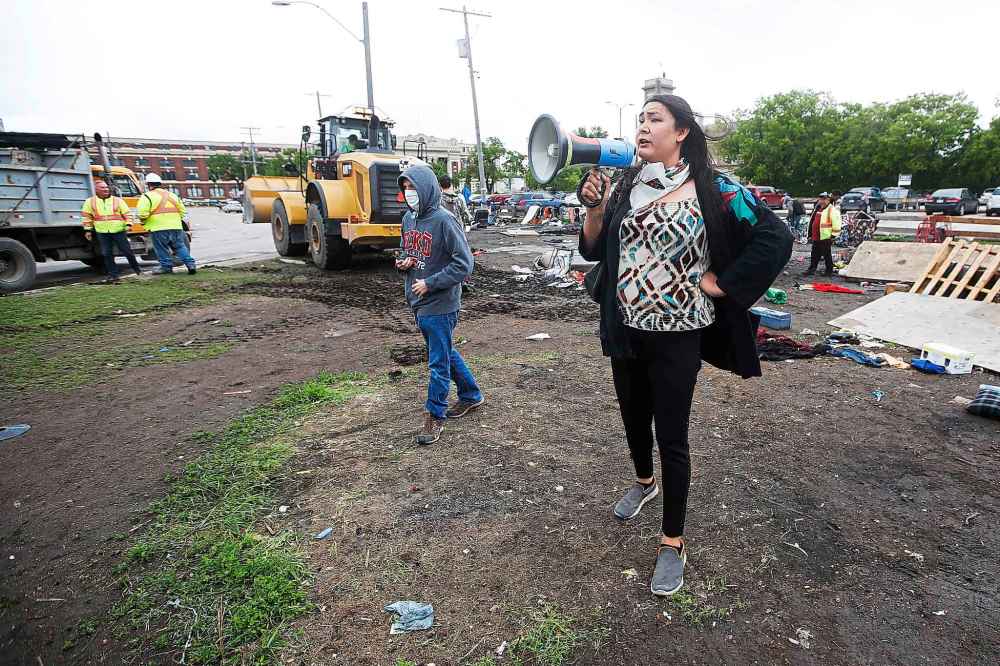
Desirae is angry, too.
Off to the side, seated outside her tent, she watches quietly, simmering. No one asked her, or any of the other residents, if it would be all right to organize a protest at the camp. They didn’t even know there were plans for one.
All of a sudden, there is a political rally happening in what Desirae considers her living room. Not one to hide her feelings, she stands up and makes a beeline for one of the organizers.
“So you’re all moving into my home?” Desirae asks, folding her arms.
The organizer doesn’t respond. The speaker falls silent. The crowd falls silent too.
“Did anyone ask if you could come here?” Desirae says, her impatience growing.
“No,” the organizer says, softly.
“I don’t care if you guys have the best of intentions, and I don’t want you all to play the victim card either, because I had a rough f–king morning,” Desirae says, before marching away.
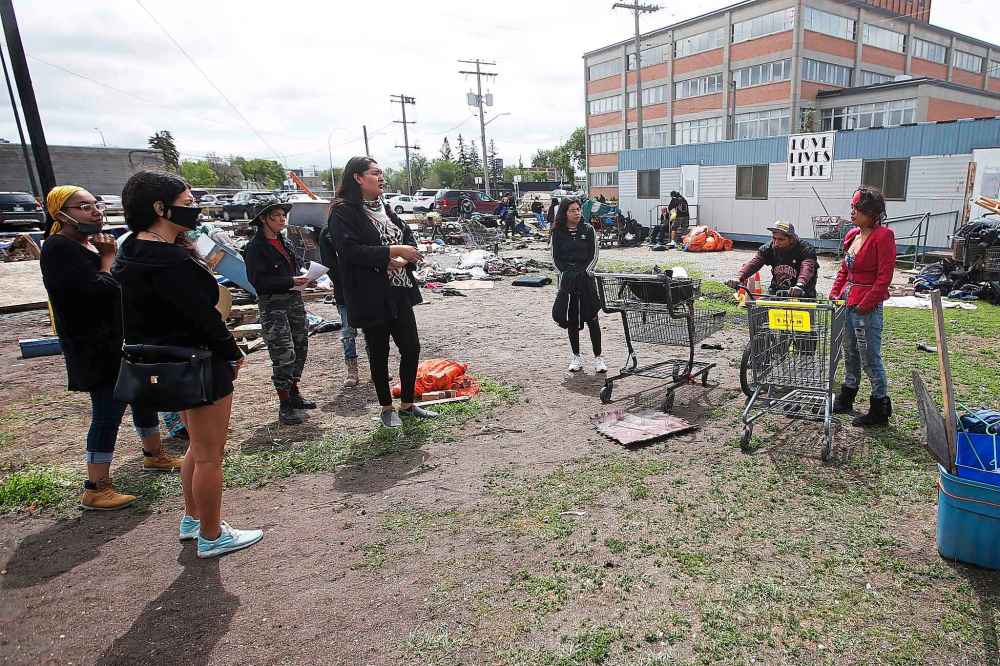
Hours earlier, civic officials handed out eviction notices to the residents of the homeless camps off the Main Street strip. Previous efforts to dismantle the camps had backfired miserably, but this time the city was intent on making it stick.
The camps had grown in size in the months since the city first moved in, spawning smaller offshoots, metastasizing across municipal land and flanking the Salvation Army, Thunderbird House and the Manitoba Metis Federation.
The MMF, which is planning a move from its Henry Avenue location to the historic Bank of Montreal building at Portage and Main, sent a legal threat to the city, complaining of harassment from camp residents and increased security costs.
The message was clear: Do something about the camps or we’ll sue.
The city moved quick, tapping Main Street Project to connect with residents to see if they would move into shelters, and handing out written eviction notices that called the camps fire hazards and threats to life and property.
The residents were given two days to pack up and leave.
Activists put out a call for a protest that afternoon, leading to the confrontation with Desirae. And having recently broken up with her fiancé, and just learned the camp she considers home is to be dismantled, she is in no mood to mince words.
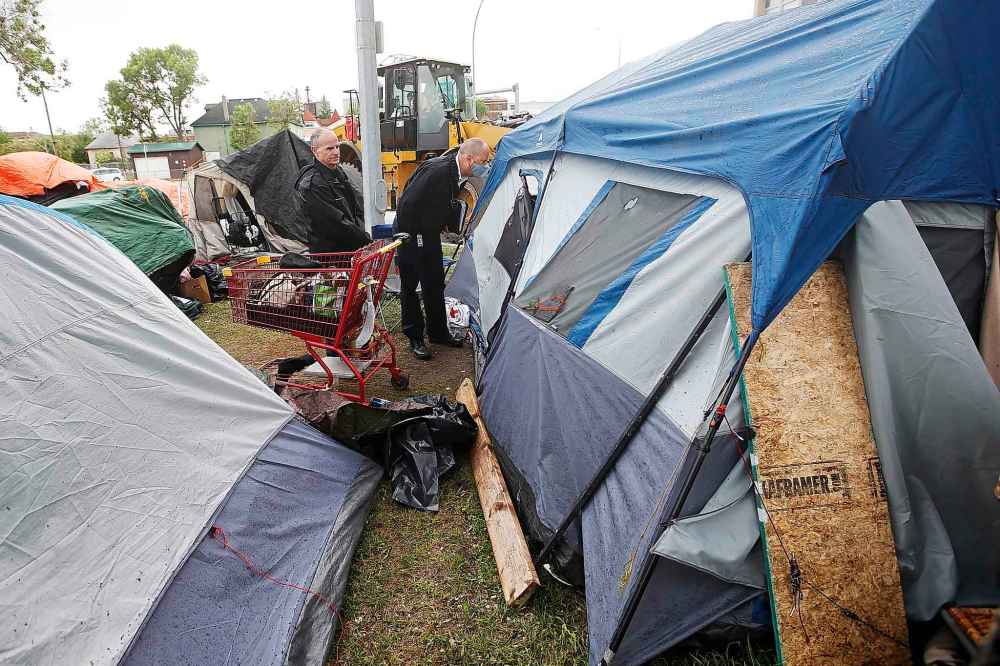
After she marches away, the organizers stand there in shock, conferring quietly, before moving onto the road and instructing the protesters to rally at the nearby MMF building. Once there, people begin hurling ire at the agency for its role in the decision to dismantle the camps.
Standing before the gaggle of protesters on the front steps, Beardy-Linklater takes the megaphone once again and denounces the MMF for what she calls the selling out of its own people. Inside the building, some employees huddle, watching near the locked glass doors.
“The Métis have such a strong and rich history on this land of being revolutionary and standing up for community. The MMF is abusing that name. They are putting down the work of Métis revolutionaries who made it possible for all of us to be here,” Beardy-Linklater shouts.
“We need to keep holding our governments accountable. Even though we’re here today, we need to put pressure on the City of Winnipeg, the Manitoba Metis Federation, specifically President David Chartrand, for these evictions.”
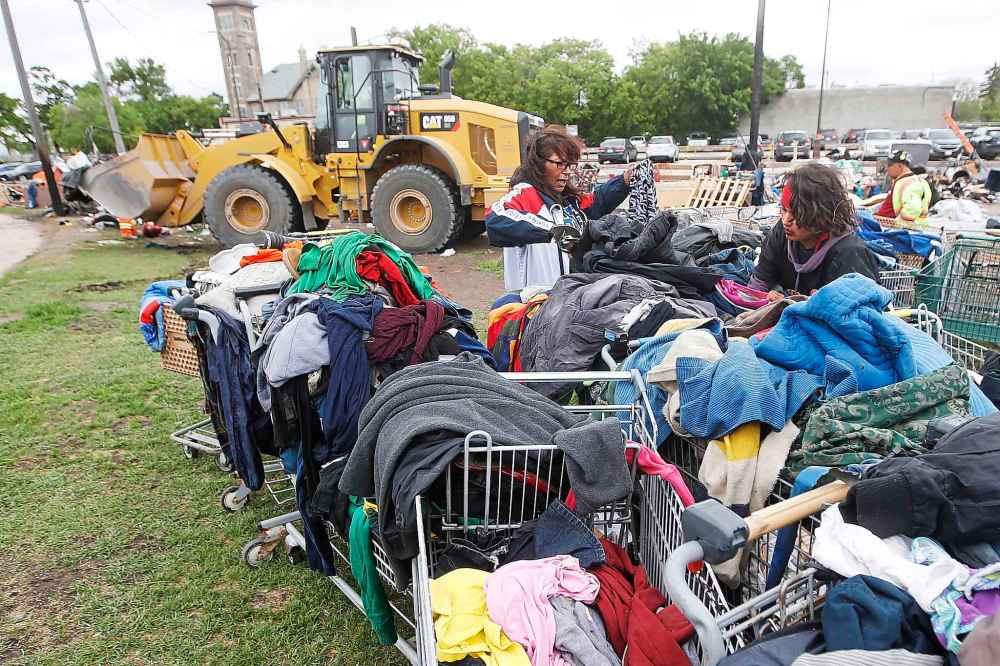
The activists consider the MMF’s actions particularly galling coming from an Indigenous organization. While much has changed about homelessness in Canada over the years, one thing has remained constant: the overrepresentation of Indigenous peoples.
It’s an issue that plagues the country as a whole, but is particularly acute in Winnipeg, where — according to the latest street census — 65 per cent of people experiencing homelessness are Indigenous, despite making up just 12 per cent of the population.
Among those sleeping unsheltered on the streets at night, 80 per cent are Indigenous. The situation is similar for homeless youth: of the 124 youth identified as homeless in the last street census, 73 per cent were Indigenous.
These figures have not undergone significant change for decades: from 1975 to 1979, 72 per cent of the people who came into contact with Main Street Project were Indigenous.
“If we don’t do something and we just stand here and we watch this shit, nothing is ever going to change! We’ve got to do something!” – Protester
This dreadful state of affairs cannot be untwined from Canada’s history of colonialism, including the Indian Act and the residential school system — the legacy of which continues to push Indigenous peoples into the streets in shocking numbers.
In the past four decades, Indigenous homelessness has spiked — particularly in urban settings. On any given night, roughly seven per cent of the urban Indigenous population is homeless, and Indigenous peoples are eight times more likely to be homeless than non-Indigenous people.
And so, when the MMF put pressure on the city to dismantle the homeless camps, the activists weren’t wrong to see it as a move targeting Indigenous peoples. Many residents of the camps, including Kyle and Desirae, are Indigenous.
No care, no home
Fifty-two per cent of Winnipeg’s homeless population who said they’d spent time in CFS, foster care or group homes, said they’d also experienced their first episode of homelessness within 30 days of aging out of care.
At the edge of the crowd, a protestor paces the sidewalk and shouts at no one in particular, like a football coach giving a halftime speech.
“If we don’t do something and we just stand here and we watch this shit, nothing is ever going to change! We’ve got to do something!” the man hollers.
As if on cue, Beardy-Linklater tells the protesters it’s time to go, that they’re taking this demonstration to the front doors of city hall. As the crowd begins to move, they chant in unison: “No evictions on stolen land! No evictions on stolen land! No evictions on stolen land!”
They stream down Henry Avenue and out on to Main Street, disrupting the midday traffic, which comes to a standstill. Drivers honk their horns — some in solidarity, others in annoyance — as the demonstrators take over the intersection of Main Street and Market Avenue.
For 20 minutes, the protesters hold a traditional Indigenous round dance at the intersection, as the cacophony of horns becomes louder and more persistent, before heading back down the other side of Main Street and returning to the steps of the MMF building.
The activists pass the bullhorn back and forth and more speeches are given.
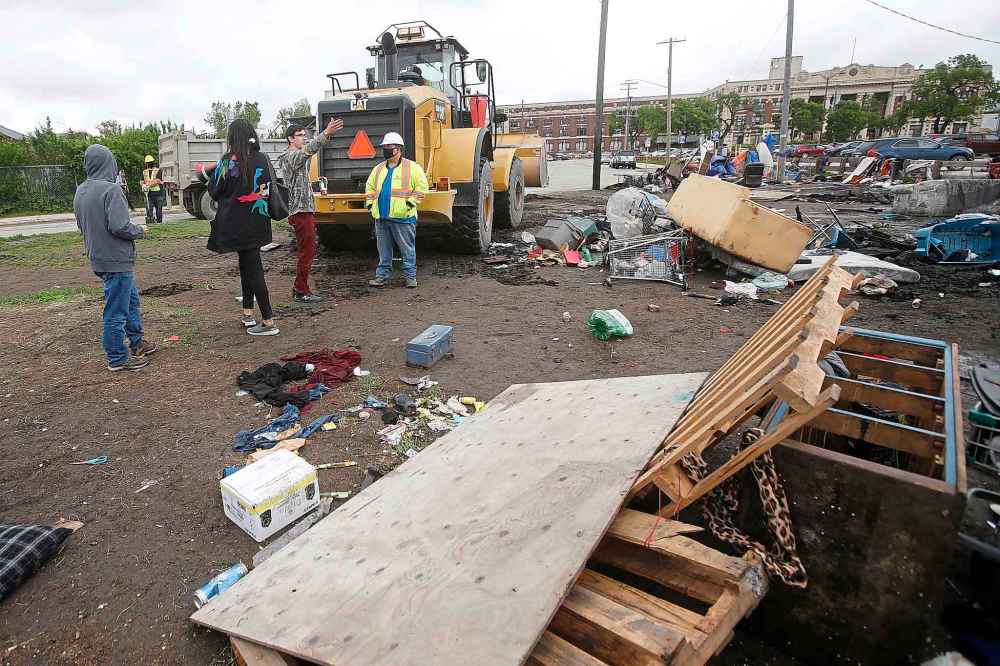
Back at the camp, Desirae sits cross-legged in the dirt near her tent, smoking a cigarette. As she speaks, she holds the cigarette between the first two fingers of her right hand, and the smoke rises into the air before disappearing in the afternoon heat.
“Watch the city f–king tear apart our home again,” she says, dejected.
“I’ll start a petition and get enough signatures. These people sure as shit don’t want us in their backyards.”
Nearby, a bottle smashes on the pavement. Someone threw it, but it’s unclear who, and it largely goes unnoticed. The protest is wrapping up — the speeches are finished, and the crowd is slowly dispersing as people peel off and trickle away.
The camp residents are left behind in their wake.
Desirae surveys the scene around her: some residents have begun dismantling their tents and makeshift shelters. The camp has been the one constant in her life in recent months, the one thing she has to hold on to.
Once again, it’s under threat.
“We build tiny homes out of garbage, out of people’s trash. We build this little community. We have a sense of leadership here, a sense of friendship,” she says, with sadness in her voice.
“And then people come here and just run through it as if it’s all garbage.”
ryan.thorpe@freepress.mb.ca

Ryan Thorpe likes the pace of daily news, the feeling of a broadsheet in his hands and the stress of never-ending deadlines hanging over his head.
Our newsroom depends on a growing audience of readers to power our journalism. If you are not a paid reader, please consider becoming a subscriber.
Our newsroom depends on its audience of readers to power our journalism. Thank you for your support.







.jpg?h=215)
